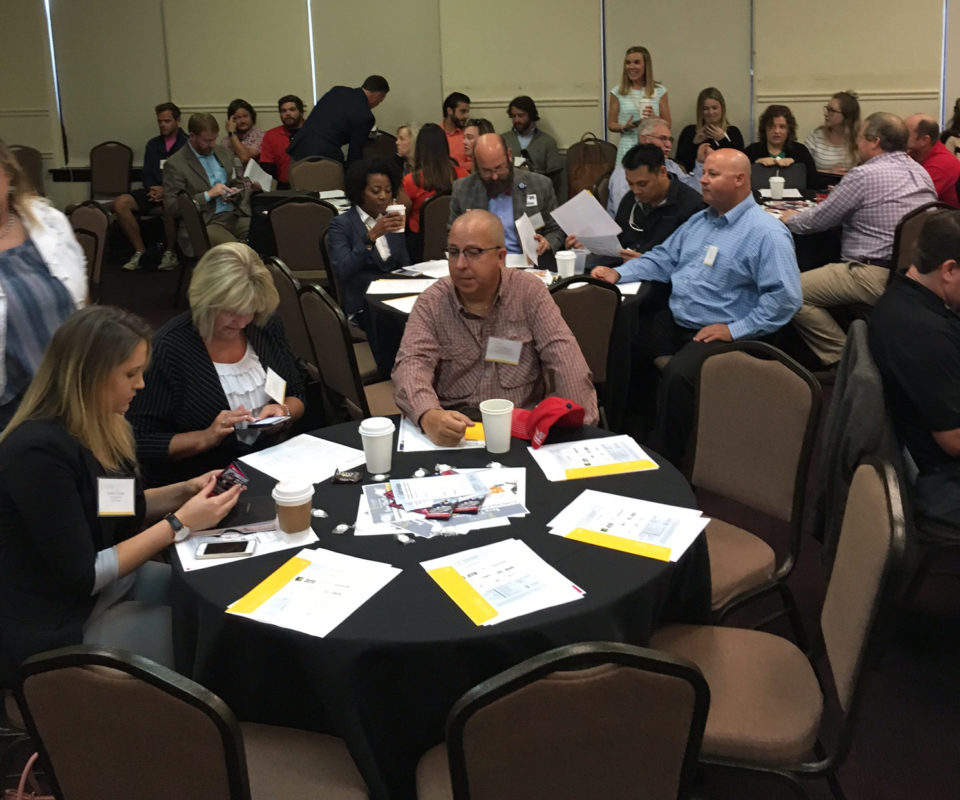SCI Training: Make time work for you
- May 25, 2017
- / Shannon Nickinson
- / training-development

What if time management isn’t about time after all?
What if there were sets of skills that you could learn to make the most of the time you do have?
More than 100 people who attending the Studer Community Institute’s May 25 session on time management with Studer Group executive Penelope Elebash learned some of those skill sets.
Attendees gave Elebash a 9.5 out of 10 rating; rated the session's value overall at 9.5 out of 10; and gave the session a net promoter score of 91 percent. Net promoter score measures someone's likelihood to not only positively review an event or experience, but also measures how likely they are to recommend that experience or service to a friend.
“Time flies. The good news is, you’re the pilot,” Elebash told the crowd at Pensacola Little Theatre. “You can’t control the hours you have, you can control how you spend them.”
The session is part of the Institute’s continuing series of leadership development.
“Managing Your Minutes: An Introduction to Time Management,” offered tips on maximizing your minutes by focusing on things you can do to squash the things that rob you of your time, compromising effectiveness, engagement and your well-being.
That includes:
— Running effective meetings.
— Using 90-day plans to manage and organize goals.
— Understanding the difference between urgency and importance when prioritizing your work.
WHAT’S NEXT?
The next SCI training workshop is scheduled for June 13 at Hillcrest Baptist Church. Speaker Autumn Morris will help new leaders and supervisors get tools, techniques and advice on navigating the their new role.
— On Aug. 24, we’ll offer a session on content marketing with Debbie Williams.
— On Sept. 21, we’ll offer a customer service session with Bob Murphy.
To track all of our training, visit. http://sslof.local/training-development/
“If you say you don’t have time for something, it often equates to your skill. It’s fitting that we’re working on time-management today, because skill-building is so much a part of that,” Elebash said. “The more you do something the better you get at it and the more efficiently you do it.”
For example, the influence of technology and connected devices on our time, attention and work-life balance can be an asset — or a real distraction.
For example, try to be without your “electronic leashes” at a meeting or in a stretch of your day, or take the Facebook app off of your phone.
The bottom line: Be present in the moment that you’re in.
“I feel that’s a practice, something you have to rewire to be good at,” Elebash said.
Other key points Elebash shared:
— Set up the best way to communicate with you in a 24-hour cycle of connection and contact.
“It’s about getting the right things done, and pursuing the right thing at the right time,” Elebash said.
— As a leader, good time management is about making sure your team members get the skills to do what needs to be done without you, Elebash said.
— What should you always make time for? Thanking people with specifics and giving recognition. The dividends those habits pay are immeasurable to you, your employees and your businesses health and welfare.
— Don’t lose time to miscommunication. Ask about someone’s expectations for turnaround, for what deadline things need to be completed. And when that is asked of you, be honest.
— Don’t save the hard things for last. “If I’ve moved 10 things a little bit, is that as valuable as move that big rock a long way. Finishing things is better than just itty bitty bits of progress.”
— Know when pick up the phone and when to email, text. Some things are better handled by a conversation.
— Don’t let perfect be the enemy of good. Be innovative about reminders, lists, to-do’s.
— Make meetings work well for you — and everyone else who is in the meeting. If you’ve exchange four or five emails about something, it’s probably time to get together in the same room and talk face to face.
— Rate meetings, have a clear agenda, share background material ahead of time, leave with a clear outcome, take the reins when someone goes off course in the meeting.
— Know how your boss works best, how your team works best, know how you work best and communicate that up the line, down the line and across. Then apply that to your client/customers.
— It’s OK to say no, but practice graceful ways to do that.
— Build your skills. Learning more helps you be better at work, life, etc.

 CivicCon launches with a look at good growth in cities
CivicCon launches with a look at good growth in cities
 Building stronger brains one baby, one parent at a time
Building stronger brains one baby, one parent at a time
 SCI debuts commercial on Early Learning City
SCI debuts commercial on Early Learning City
 Entrecon: World class speakers and an opportunity to sharpen skills
Entrecon: World class speakers and an opportunity to sharpen skills
 PYP Quality of Life survey 2017
PYP Quality of Life survey 2017
 EntreCon Pensacola 2016: A look back
EntreCon Pensacola 2016: A look back
 Leadership tip: getting better employee takeaways
Leadership tip: getting better employee takeaways
 Leadership tip: be interested instead of interesting
Leadership tip: be interested instead of interesting
 Leadership tip: delivering difficult messages
Leadership tip: delivering difficult messages
 Brain Bags boost Arc, Early Childhood Court programs
Brain Bags boost Arc, Early Childhood Court programs